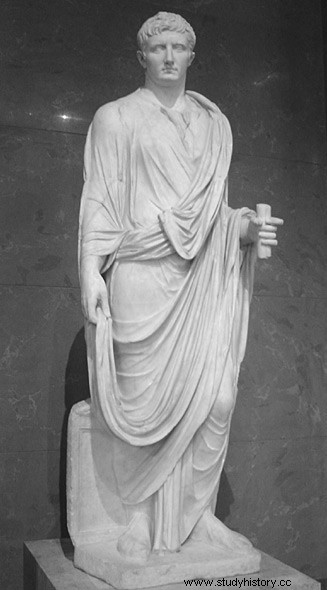
The Roman empire is divided into two parts.
One is "Principate" started by the first emperor, and the other is "Dominates" started by Diocletian.
It is very difficult to explain "Principate", which is the subject of this time and can be said to be the first empire of Rome.
After all, Principate itself could be called a magnificent "deception", because it was an illusion cleverly shown by the first emperor, Oktavianus.
Previously, I wrote about the fact that the "concept of the emperor" of the West and the East is different.
The concept of the emperor in the Orient is close to Dominates, which was started by Emperor Diocletian, and Principate is in a sense far away.
This time, we will talk about such "Principate".
The word "Princeps", which stands for the first person, has been around for a long time.
When reading high school world history textbooks, it seems that "Princeps" refers to the emperor, but in fact, the word "Princeps" has been around for a long time, and that kind of existence existed. ..
"Princeps Senatous" represents the leading figure in the Senate, for example, Appius Claudius, who founded the Appian Way, and the Great Cato, which destroyed Carthage, were regarded as one of the most prominent figures in the Senate. It was called Princeps Senateus.
This name is very different from the dictator, and it has a strong meaning of being a person who leads the Senate while respecting the Senate and the republic.
Attitude to respect the Senate
Octavian, who succeeded Caesar, wondered why Caesar was assassinated.
It is said that there were more than 40 Caesar assassins, including Cassius Longinus and two Brutus, and they were more likely to assassinate Caesar to maintain the republic than to hate Caesar.
It can be said that Caesar himself tried to promote dictatorship as a lifelong dictator, which led to the opposition of the Senators.
Therefore, Octavian showed an attitude of respecting the Senate, unlike Caesar.
At that time, he named himself "Princeps Senatus (the leader of the Senate)" and "Princeps Kivitates (the leader of Roman citizens)", that is, he was the leader of the Senate. He declared that he would respect and protect the republic.
It's very different from the oriental tyranny. However, the contents were quite close.
Tribune privileges and imperator
Caesar couldn't, but Octavian could.
It was to become a tribune.
Since Octavian was from the Equites class rather than a prestigious aristocrat, he was able to become a tribune himself and enjoy his privileges.
The most powerful of the tribune privileges are the sacred inviolability and veto of the body.
The veto is particularly strong, which gives Octavian a veto against the Senate.
This idea of veto was introduced into the United Nations, which was formed in the 20th century, and the five permanent members still have this strong right of veto.
Originally, the tribune had a one-year term, but Octavian cleverly changed it to a one-year automatic renewal. This idea is currently used by many companies for commercial activities.
This meant that the Senate couldn't decide anything without the permission of Octavian, but it was so clever that no one noticed it.
If you think about it, Octavian wanted to execute Cicero before anyone else, probably because he was a wise man.
Rome had lost a major figure in the civil war around this time.
And another powerful one was "Imperium".
Is Imperium the "commander-in-chief" when translated into modern Japanese? It literally means the commandership of the army.
This in itself had Caesar and Pompey in the past, and was originally a right given to the consul for a one-year term.
In the Roman Republic tradition, the course of becoming the governor of a province as a proconsul after becoming a consul or praetor was the Cursus Honorum (prestigious course), but with the imperium of Octavianus, of course Rome He also gained military rights in the provinces and became the de facto emperor.
Simply put, both domestic and military powers were concentrated in Octavian.
Later, when the language of English was established, the word "emperor" was coined. This is because the one with imperium was called imperator.
Augustus and Caesar, inherited names
Once the biggest rival of Octavian, Antonius described Octavian, who was 18 years old, as "a young man who inherited the name of Caesar."
But Antonius did not understand how powerful it was to inherit the name of Caesar.
The fact that Octavian was adopted by Caesar and inherited his name meant that he inherited all of it.
For that reason, all the people who are said to be Roman emperors after Octavianus were adopted by the former emperor and inherited the name of "Caesar", and the name "Caesar" came to represent the emperor.
For example, the official name of Emperor Aurelius, known as the Five Good Emperors, is "Impetral Caesar Marcus Aurelius Antoninus Augustus", which has inherited the names of Imperator and Caesar.
"Kaiser" for the emperor in German and "Tsar" in Russian are Caesar's German and Russian readings, respectively, and this is the reason.
In addition, the Senate gave the honorific title "Augustus" to Octavianus, who won the Battle of Actium and ended the internal turmoil. This means "a dignified person," and since then it has come to refer to Octavian, and this name has been passed down to successive emperors.
Thus, the man who claims to be the leading Roman figure succeeds in gaining his powerful authority and passing it on to successive emperors along with his name.
Principate refers to a government in which Princeps, a leading figure in the protection of republican government, promotes politics while respecting the Senate.
Later scholars translated "former head of state" as a regime that gathered military and internal governments into one person while maintaining the form of republican government.
Thus, the First Empire of Rome began.
